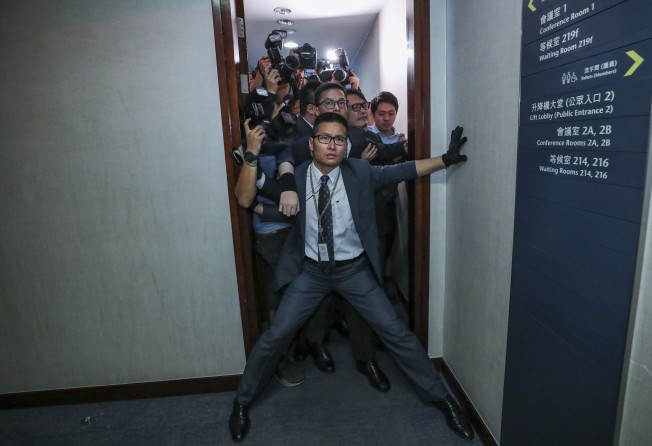
Hong Kong extradition bill explained: how did we get into this mess and what happens next?
- The impasse in the Legislative Council means pro-establishment lawmakers are looking at radical options to make the bill law
- Politicians on both sides have proposed solutions and time is running out if government’s July deadline is to be met

Lawmakers in Hong Kong pushed and shouted at each other as they fought for the control of the committee to scrutinise a controversial extradition bill last Saturday, sending the legislature into unparalleled chaos.
The scuffle in the Legislative Council was triggered by the government’s push for a case-by-case model to transfer fugitives to any jurisdiction that Hong Kong lacks a formal agreement with, including mainland China.
It has also led to a procedural row between rival camps, who called their own meetings and refused to recognise the legitimacy of the opposing faction’s gathering.
A similar but shorter clash on Tuesday led to the pro-establishment’s Abraham Razack, the presiding member, warning the situation had to change and urging both sides to talk to each other.
But what exactly has happened in Legco, and what comes next in the passage of this highly contentious bill?

How is legislation normally handled in Hong Kong?
A legislative bill has to go through three separate readings to become law. After being tabled, it receives a preliminary debate in its second reading and is then adjourned to be referred to a bills committee for detailed examination.
At the bills committee stage, officials and lawmakers vet the proposed legislation on a clause-by-clause basis and can also make amendments to the original bill. The bill is then referred to the full council to resume the second reading and to be debated. After a third reading, the bill is then put to a vote.
A government bill needs to secure a simple majority, or 35 votes, from lawmakers to become law. The government announced in mid-February its intention to amend the extradition law, and formally introduced the bill in April.
The process is now at the beginning of the bills committee stage, but has not moved into any substantive scrutiny since it was introduced.
What has caused the deadlock?
The bills committee has been caught in tit-for-tat bickering between rival camps over procedural matters, to the extent that little to no progress has been made since April.
The pro-democracy camp, which is stringently opposed to the new law, successfully stalled the first two meetings, even preventing the election of a committee chairman.
In response, the pro-government camp removed pan-democratic lawmaker James To Kun-sun from his position of presiding member, and replaced him with Razack.
Pan-democrats and Andrew Wong Wang-fat, an expert on parliamentary rules and procedures, challenged the legality of the move, and based their objections on the involvement of the Legco secretariat, which is supposed to remain neutral, in the matter.
Attempts to hold meetings last Saturday, and again on Tuesday, descended into chaos.
What’s the solution?
Who knows? But there have been compromise suggestions floated by politicians on both sides.
After hardliners from within the pro-establishment camp threatened the nuclear option of dissolving the bills committee and sending the bill straight to the council for a full vote, independent Paul Tse Wai-chun proposed the creation of a special task force to find a way forward.
However, the pro-democracy camp refuses to accept that, and there are also splits within the pro-establishment bloc on how to proceed.
On the pan-democrats’ side, To has urged the creation of a tripartite meeting with the government joining both sides in trying to hash out an agreement. However, the government has expressed its unwillingness to be involved, saying it is for the two rival factions to sort out.
What happens next?
Razack has already said he cannot hold a meeting and has asked the house committee for guidance.
To’s proposal was greeted with cautious optimism by some pro-establishment lawmakers, but it is too early to say whether that will break the deadlock, and no agenda has yet been set.
The government has distanced itself from any “peace talks”, claiming the chaos originated from a procedural row and should be Legco’s internal business. But pro-democracy and pro-establishment lawmakers have criticised that stance.
“It is impossible that the government would entirely leave it to us, it should shoulder some responsibility too,” said one frustrated veteran pro-establishment lawmaker.
Meanwhile the fate of the bills committee remains up in the air. Depending on talks between both sides when the matter comes up at the house committee on Friday the earliest, lawmakers may choose to appoint a new presiding member to replace Razack, create a task force as proposed by Tse, or take the radical step of sending the bill straight to a full vote.
What’s the rush?
The government has repeatedly stressed the urgency of the bill, and wants to put it to a vote before Legco’s summer recess in July. Time is ticking for it to use the new law to extradite Chan Tong-kai, who has admitted killing his pregnant girlfriend last year in Taipei.
Chan was jailed in Hong Kong in April over related money-laundering charges, and could be released this October.
Taiwan, however, said it may not cooperate if Hong Kong pressed on with the new proposal. Its Ministry of Justice has urged the government to separate Chan’s case from the legislation, to avoid judicial cooperation becoming entangled with political issues.
It is uncertain whether the scrutiny of the bill can be fast-tracked over the next two months. If the pro-establishment camp resorted to the radical move of bypassing the bills committee entirely, it could potentially save weeks, making it possible to pass the bill by July.